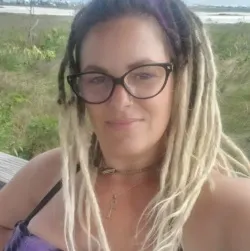I have a lot of retrospect - and some regret - about the off grid property that we purchased to homestead on. When you start looking at off grid properties, it becomes very overwhelming and it is easy to focus on just the positives, like when you are out shopping for a car. You take it for a test drive and everything seems great, until you sign on the dotted line. Once you get it home and really check it out, you begin to notice all sorts of issues.
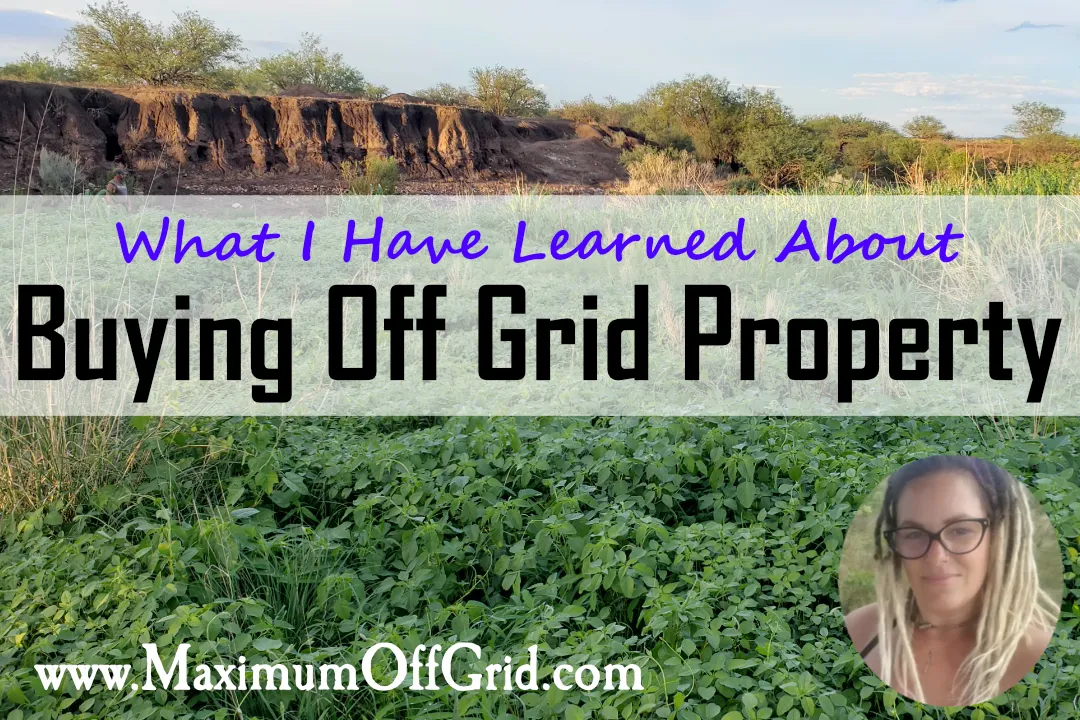
This is the same for property! You go to the property, inspect it a few times, convince yourself of how great it is, and then sign on the dotted line. Once you move onto the property, you will start noticing all the issues about it, things you would never have even thought of before.
That is why I am writing this post, to help you navigate through the checklist of what to look for when buying off grid property.
This is a continuation article from my recent post, The Five Systems You Need For Living Off The Grid. This is the first of the five systems I talk about. Check it out!
Before you even THINK about buying that off grid property you have been eyeing, you need to think of the legal stuff. And there is a TON of legal stuff to deal with here in America. It's seriously annoying and can be life changing if you choose a property in a highly regulated area.
Legal Stuff To Watch Out For:
Property Taxes - take a look at what the previous owner was paying in taxes. Make sure you are prepared to settle that bill twice a year. However, you may be in a seperate tax bracket than the last owner. Our property taxes went through the roof, because the previous owner was elderly so she received a much lower rate. Also, consider if there are any backtaxes on the property that need to be paid.
Within City Limits - I recommend not getting property within a city limit, because if you do, you will have to be mindful of both city and county building codes. Also, you need to think about how strict the building codes are on the property you are looking at. Property in high value areas are usually crawling with inspectors, ready to bust you for not filing permits and not building to code. Look for something remote, in a low value area where neighbors are not upgrading homes. This way you can fly under the radar.
FEMA Flood Zones - If you are trying to finance an off grid property and need help from the bank, you will strike out if you in a FEMA flood zone. The flooding maps are outdated and obsolete, so even if you think you are not in a flood zone, you very well could be according to FEMA.
Big Tip! Live in the area of your prospective property for ONE YEAR before purchasing!
This is probably one of the biggest regrets when I bought my property. I did not live in the area for one year, so I did not experience the four seasons. Each climate is different, down to a small radius, that no information online can tell you how exact it is.
Our property is by an old riverbed, so all the cold air sinks in from the valley. Our climate is usually 10 to 20 degrees colder in the winter than five miles up the road! This affects our growing season, pushing us out an entire month of gardening. That is a huge deal for us.
We also have a very long dry season, much longer than we anticipated. Our property is so lush and green and beautiful in the rainy season:
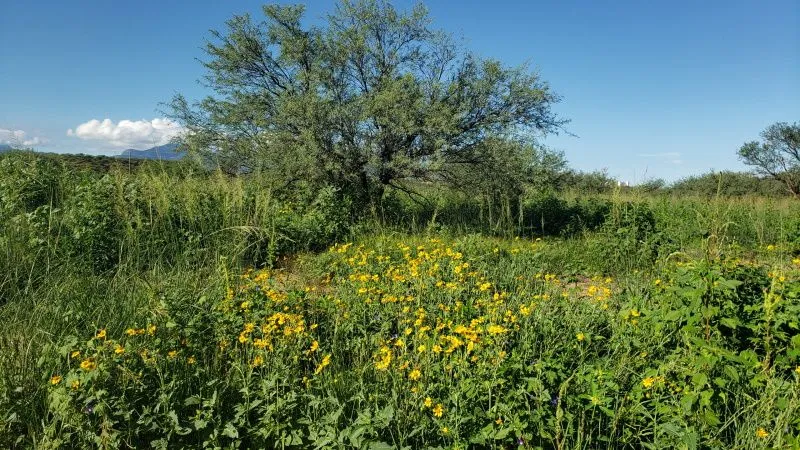
But the dry season lasts for about 6-8 months, and it is dry as a bleached bone in the desert sun.
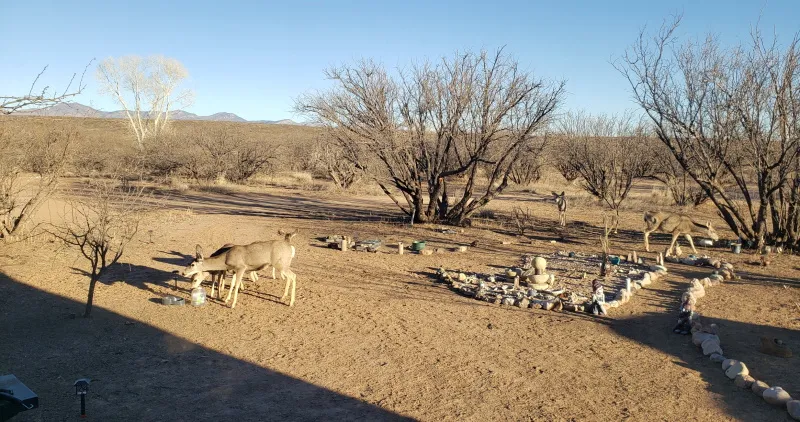
Wow, what a difference!
Because the weeds grow so tall during the wet season, and then dry out so quickly, we now have a large swath of our property covered in dry brush that is posing a fire hazard. But we have not been able to afford a tractor to mow it down. Not a good situation.
Can You Take Care of the Property?
Can you afford the equipment needed to take care of your property? Do you have the money to build the fences, rent the equipment, purchase tractors and farming equipment? It is so much more expensive to afford the materials and equipment needed to properly maintain a large chunk of property.
Off grid hidden expense: Equipment Maintenance
If you can afford tractors and mowers and tillers, do you have the know how to fix them when they break down? Do you know how to change oil and filters? If not, you will be paying big time to the local mechanic to care for your equipment.
These are all the things I really did not consider when we purchased 30 acres. We got such a great deal on the property, we bought it up. But now, we don't have the necessary equipment to really maintain it, and likely won't be able to get it for quite a while.
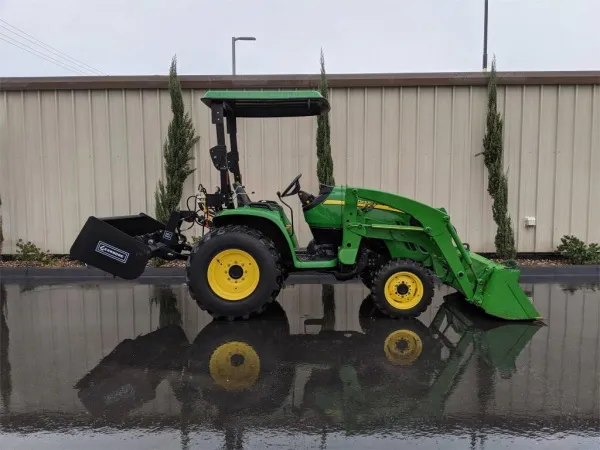
This small John Deere tractor costs $30,000 new in America, and that doesn't include attachments. You can find a used tractor for around $15,000 but you better know how to work on it, because tractors like to break down.
Don't get in over your head
I suggest going with a smaller parcel, maybe no more than 10 acres, so you can maintain it easier than something big like 30+ acres. Also, purchase something that naturally takes care of itself which doesn't require much maintenance.
Here are some more factors to consider that I will cover in other posts, as this one is now getting quite long:
- Road access and road maintenance
- Fresh water for drinking, gardening, and livestock
- Natural building materials
- Quality of soil
- Sunlight for solar power
- Wind for wind power
- Natural food sources
- Adjacent access to public lands
I hope you found my article helpful and informative. Please give me a follow if you would like to stay updated on my content.
If you want to learn more about off grid living, visit my website, www.MaximumOffGrid.com.
Thanks for reading!
Sincerely, Regina Cal.
